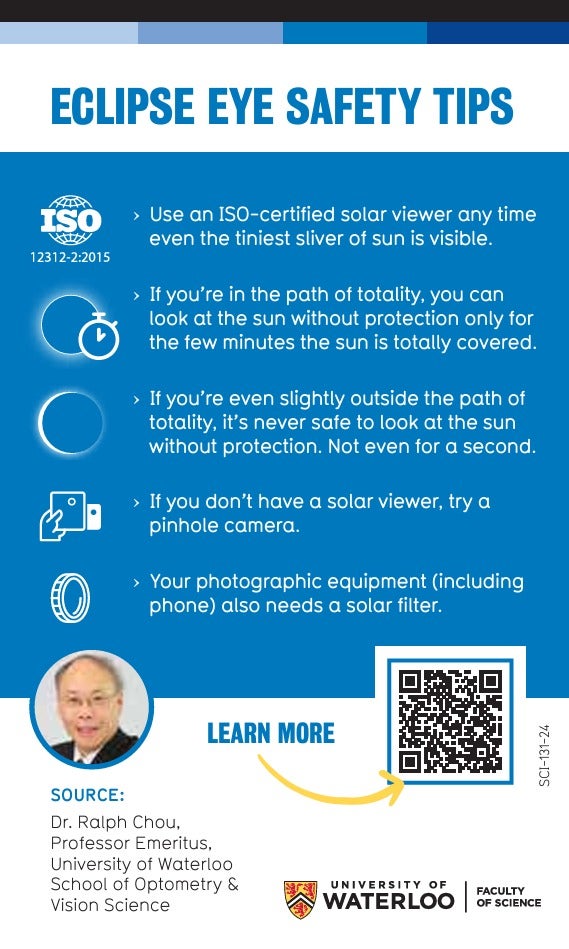Editor:
Brandon Sweet
University Communications
bulletin@uwaterloo.ca
Q and A with the experts: How to safely view an eclipse

A total solar eclipse is a rare and special event. While the eclipse won’t be quite total in Waterloo Region, the deep partial eclipse will still be fascinating – and potentially damaging. Dr. Ralph Chou, professor emeritus in Optometry & Vision Science, is one of the world’s foremost experts on eclipse eye safety.
Why is the April 8 solar eclipse special for North America?
A solar eclipse is when the moon passes right between the sun and the Earth. In some eclipses, the moon isn’t quite big enough to cover the sun – that’s an annular (ring) eclipse. Other times, the moon doesn’t completely cover the sun – that’s a partial eclipse. However, the eclipse on April 8 is a total eclipse – for most of us, a once-in-a-lifetime experience.
For people within the path of totality, which in Canada ranges from Pelee Island to Newfoundland, the sun will be fully covered for a few to several minutes, and the faint outer atmosphere of the sun will be visible.
What are the dangers of looking directly at a solar eclipse?
We reflexively avoid looking at very bright objects. However, during an eclipse, our curiosity may encourage us to look at the sun even if it’s uncomfortable. The high level of light that reaches the back of the eye can damage the light-sensitive cells. Depending on the amount of damage, the visual symptoms may be transitory; they may last a long time – perhaps months – or they may be permanent.
The part of the eye most damaged by looking at the sun without protection is the fovea, which we use to see fine details. While you may not lose all your vision, you may have difficulty with tasks such as reading. You could even end up legally blind.
How can the public safely view the eclipse?
There are inexpensive devices available that enable you to view the eclipse safely. These include solar viewers, which you hold up to your face, and solar eclipse glasses, which you can wear like spectacles. These are fitted with special filters, so they’re safe to use if they cover your eyes completely. If you wear glasses, they go over the top.
Make sure your solar viewer complies with the international standard, ISO 12312-2. The device should come with warning messages, instructions on safe use and a statement saying it complies with the standard.
If you’re in the path of totality, it will be safe to remove your solar viewer when the sun is fully covered. In Niagara Falls, for example, totality will last about three and a half minutes. The moment the tiniest sliver of sun returns, you must use your solar viewer again.
If you don’t have a solar viewer, you can make a pinhole camera, which projects an inverted image onto the inside of a box.
What do people outside the path of totality have to consider?
For people in Waterloo Region and anywhere even slightly outside the path of totality, there will never be a point when it’s safe to look at the sun without a certified solar viewer. While it may get darker during a deep partial eclipse, the sun will never be fully covered, so even the tiny crescent that’s visible can damage your eyes.
Don't look up without looking at these eclipse tips

A total solar eclipse will be visible across eastern Canada today, including parts of southern Ontario, that is, if the clouds happen to part at the appropriate time this afternoon. A partial solar eclipse will be visible across a much wider swath of the continent. The School of Optometry and the Faculty of Science have created a handy safety tip sheet for viewing partial and total solar eclipses without doing damage to your precious eyeballs.
- Use an ISO-certified solar viewer any time even the tiniest sliver of sun is visible;
- If you're in the path of totality, you can safely look at the sun without protection only for the few minutes that the sun is totally covered;
- If you're even slightly outside the path of totality, it's never safe to look at the sun without eye protection, not even for a second;
- If you don't have a solar viewer, you can try to make a pinhole camera using instructions found online; and
- Any photographic equipment you use to record the event, even your phone, will need a solar filter.
Check out this explainer video created by the School of Optometry and Vision Science for more information.
Now, this all might be moot if the clouds persist today, but don't say we didn't warn you. In fact, we should double down on our warnings because a thin skein of cloud cover isn't enough to protect your unprotected eyes from solar UV damage should you look at the sun without appropriate eyewear.
Campus emergency communication system to be tested tomorrow
A message from Information Systems & Technology (IST).
Information Systems & Technology (IST)will be testing the University’s campus-wide emergency communication system on Tuesday, April 9, at 1:45 p.m.
What is the impact?
Emergency communication channels being tested include:
- Tweets to @UWaterloo and @WatSAFEapp;
- WatSAFE mobile app;
- The ‘WatSAFE Desktop Notification’ on-screen pop-up for desktops and laptops; and
- Portal alerts and push notifications.
Messaging
The message displayed will read “TEST of the UW Emergency Notification System. During an actual emergency or threat, you would receive instructions. No action is required.” More information regarding the emergency would be available at alert.uwaterloo.ca.
Approximately 15 minutes after the test activation message is sent, a deactivation message will display, “The test of the UW Emergency Notification System is complete.”
In the event of a real emergency during this test, please contact Police Services at 519-888-4911, or ext. 22222.
Be sure to install the WatSAFE app on your device and WatSAFE Desktop Notification tool on your desktop/laptop to receive this test message, and more importantly, to stay informed of campus emergency situations. Visit the WatSAFE website for more details.
Questions or concerns? Please contact the IST Service Desk via the IST Help Portal.
Notes as the senate meeting eclipses other business
Today is the last day of classes and lectures for the spring term, with pre-examination study days taking place Tuesday, April 9 and Wednesday, April 10. The examination period runs from Thursday, April 11 to Thursday, April 25.
The University's Senate meets today at 3:30 p.m. in NH 3407. Among the agenda items:
- A motion to approve the creation of the Type 2 Graduate Diploma in Climate Change, effective September 1, 2024;
- A motion to approve major modifications to the Master of Arts (MA) in Recreation and Leisure Studies, effective September 1, 2025;
- A motion to approve academic regulation revisions to the Approved Doctoral Dissertation Supervisors (ADDS) section of the Graduate Studies Academic Calendar (GSAC), effective May 1, 2024;
- A motion for Senate to delegate its authority for the approval of the roster of graduands jointly to the chair and vice-chair of Senate, for convocation ceremonies scheduled in June 2024 and October 2024; and that Senate direct that a report on the complete roster of graduands be presented for information to the Senate meeting following the relevant convocation;
- A motion to recommend that the Board of Governors approve the 2024/25 Operating Budget, which will be presented by Vice-President, Academic and Provost James W.E. Rush.
The consent agenda, which is approved in bulk by a single motion, contains the following action items:
- A motion to approve academic regulation revisions to the Graduate Studies Academic Calendar (GSAC), effective May 1, 2024;
- a motion to approve academic regulation revisions to Doctor of Optometry Academic Regulations, Course Grades and Credits, and Online Course, for the Faculty of Science, effective September 1, 2024
Senate will also vote to approve members on various Senate committees and councils as well as the election of members to the Board of Governors. The Teaching Awards Committee will share a report on the Amit and Meena Chakma Aware for Exceptional Teaching by a Student and the Distinguished Teacher Award.
The full agenda is available on the Secretariat website.
Link of the day
The story of WipEout: the first rave-inspired video game
When and Where
The Student Health Pharmacy (located in the lower level of the Student Life Centre) is offering flu shots with no appointments needed daily from 9:30 a.m. to 3:30 p.m. Call 519-746-4500 or extension 33784 for more info. COVID shots will be available on appointment basis only. You can register online at studenthealthpharmacy.ca.
Warriors Youth Summer Camps. Basketball, Baseball, Football, Hockey, Multi-Sport and Volleyball. Register today!
Lectures and classes end, Monday, April 8.
Equitable Recruitment and Selection, Monday, April 8, 1:00 p.m. to 2:00 p.m., online.
University Senate meeting, Monday, April 8, 3:30 p.m., NH 3407 and online.
Pre-examination study days, Tuesday, April 9 and Wednesday, April 10.
Brain Day 2024, Tuesday, April 9, Davis Centre.
WaterLeadership | Innovation Leadership Skills, with special guest Karen Kun, director and co-founder of Waterlution, Tuesday, April 9, 12 noon to 1:30 p.m., E2-2350.
Chemistry Seminar: PFAS and policy: Linking the chemistry of fluorinated gases with chemical regulations, Tuesday, April 9, 2:30 p.m., C2-361 Reading Room.
University of Waterloo Staff Conference, Wednesday, April 10 and Thursday, April 11.
Planning your research trajectory: Strategies for Success for researchers in the first three years of a tenure-track appointment, Wednesday, April 10, 10:00 a.m. to 12 noon, J.R. Coutts Engineering Lecture Hall – RCH 301. Please register to attend.
Building Statistics Canada’s water accounts with considerations for valuation, presented by Ann-Helen Jean-Baptiste and Mark Henry, water and ecosystem accounts, Environment, Statistics Canada. Part of the Water Institute's webinar series: The Value of Water in Canada, Wednesday, April 10, 12 noon.
Map the System Campus Finals, Wednesday, April 10, 12 noon to 2:00 p.m., GreenHouse space, United College. Register now.
Final examination period, Thursday, April 11 to Thursday, April 25.
Board of Governors meeting, Tuesday, April 16, 1:30 p.m., NH 3407 and Zoom.
Post-covid freedom discourses and their influence on the politics of climate intervention, Wednesday, April 17, 2:00 p.m. to 3:00 p.m., DC 1304.
IQC Public Lecture featuring Dr. Rajibul Islam, “Open Quantum Computing, One Atom at a Time,” Wednesday, April 17, 7:00 p.m., QNC 0101.
The Foundation: Building Inclusive Research Teams, Thursday, April 18, 10:00 a.m. to 11: 00 a.m. Register here.
Games Institute (GI) research symposium, “Disrupting Disciplinary Divides for Digital Futures”, Friday April 19, East Campus 1.
NEW - Green Labs Earth Week Challenge, Monday, April 22 to Friday, April 26.
Earth Day Campus Clean-up, Monday, April 22, 11:00 a.m. to 1:00 p.m., supplies available at DC Green.
WISE Public Lecture, “Virtual Power Plants: Navigating through Foundational Concepts, Technologies Involved, Strategic Impacts, and Development Challenges” by Amir Miragha, (PhD, SMIEEE, Global Senior Principal Architect, Schneider Electric.), Monday, April 22, 1:30 p.m. to 2:30 p.m., CPH Fourth floor 4335., in-person and on Zoom. Register today!
Operating Budget Town Hall, Tuesday, April 23, 1:00 p.m. to 2:00 p.m., NH 3407.
Deadline to get "Fees Arranged," Wednesday, April 24.
An Evening with Astrophysicist Dr. Avery Broderick, Wednesday, April 24, 5:30 p.m. to 8:00 p.m., Federation Hall.
NEW - Safeguarding Science workshop and more, throughout May and June. Public Safety Canada invites faculty, staff and students to attend a series of virtual event via MS Teams. Register to receive a link.
NEW - Equitable Recruitment and Selection, Monday, May 6, 1:00 p.m. to 2:00 p.m.